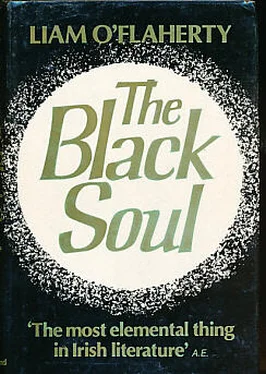He walked away in silence, with his hands behind his back. ‘Now everybody has deserted me,’ he mumbled. ‘Now I’m alone. Good God, have I a friend nowhere! Nobody wants me for myself, but to satisfy curiosity or passion or something. I am accursed.’ A cold breeze was blowing from the sea, bearing with it the smell of wet seaweed. It seemed to him to be like the smell of the balm that Egyptians rubbed into dead bodies, although he was totally ignorant of what that smell was. But death seemed to be in the air, stalking in front of him. He could smell it and feel it and fear it, but he could not see it. A horrible feeling of being utterly alone and deserted on the eve of a great danger grew intensely, until it numbed his desire to live and he felt very weak. The sun was setting, and he sat on a hillock just above the village to watch it. The sun had begun to sink into the sea to the west. He could look into its red face without blinking. Then across the sea towards Inverara the sun shadow swept in a silvery streak. It touched land and became red for a moment, then blue as it reached the tilled fields, then ending on the crags in a blaze of light that was all the colours of the rainbow. Then, as if the sun made a last dying struggle to keep back the approaching night, a flood of light poured out from it, carried on myriads of bright shafts, like the bristles of a hedgehog. The whole of Inverara and of the sea, and the flanks of the mountains on the mainland, gleamed for a minute in the staggering light, and then slowly dimmed again as the light crept away westwards towards the sinking sun, and the shadows of night pursued them and the sun sank lower and lower. The air became cooler. The wind began to make dark ripples on the sea. Stars tottered out. Then the sun disappeared.
And looking at the point where it disappeared, he shuddered and thought that somebody who had been sick for a long time within his breast had died.
1
They were opening the bowels of Inverara. The potato stalks, once green, flower-decked and beautiful, were withered. They crackled as the women tore them from the ridges. The men rooted up the earth avariciously with their spades to gather the fruit that had matured in its womb during the heat of summer. Rain-bleached potatoes lay in rows on the flattened ridges. There were only bristles left in the ryefields. Inverara was being stripped naked.
The horses, carrying home the crops, no longer galloped as they did in spring. They moved slowly with downcast heads, their baskets creaking on the canvas of their straddles. There was a melancholy silence in Inverara, broken only by the bleak whine of the autumn wind, chanting the death song of the year. Cattle were driven southwards each day from the parched plains to the long hill grass in the valley between the crags. The flowers were dead. And the blackberries had ripened, the enchanted fruit that were eaten by the black devils that rode on the storm of winter.
Inverara was like an old man groaning with his years and talking of death. Rain fell each day, drowning summer. The air was damp, and heavy mists hung by day and by night over the ridge of Coillnamhan. Sometimes the mists shut out the sea, and only its sad murmur could be heard, coming through the fog like the wheezing of an old man sick with pleurisy. The shore at Rooruck was strewn with offal, rotting timber, torn seaweed, heads of dogfishes, worthless refuse after the joyous debauch of summer. The broad grey crag of Rooruck shone sombrely, washed by the ceaseless rain mist. And water gushed from the crevices in the faces of the cliffs, falling with sad sounds in zigzag courses down the cliffs to the sea, as though autumn were washing Inverara. The sun shone dimly through the dun clouds on Rooruck, dimly as if it perpetually frowned. Hosts of shadows continually flitted along the Jagged Reef southwards towards the cliffs, like spirits shielding something that fled. The men working in the harvest fields often stood erect, caressing their sore backs and cursing the laggard sun, for work that was joyous in spring was now painful, and the time dragged slowly, like a dying man’s breath. For time is a measure of pain.
Suddenly, through the autumn fog, a noise came to Red John’s ears. It came to him in the early morning. He was sitting by the fire, waiting for Little Mary to come in from the cow with the milk. The flood tide had just made. There was a fever in the air. The sea was fermenting. The noise buzzed in his ears and he got up and left the cabin. It was as if somebody had uttered a command and he had to obey it. He walked swiftly, without thinking, quite calmly, down to the shore, just south of the Jagged Reef. He threw out his right hand in front of his face as he walked, with the fingers extended and making signs at some invisible thing in the air. His red and white gums were bared in a grin. He was amused because he had suddenly felt that he must wash his feet in the sea and that if he did not do so he would die before night. He sat by a pool of sea-water and washed his feet in it without taking off his shoes and stockings. Then he walked back again to the cabin calmly as if he had just done a daily task.
The cabin was still empty. The Stranger slept. Little Mary was at the cow. He sat by the fire and tried to sink back into his usual idiot’s dreams. But he could not. Again the buzzing came into his ears and then a pain shot across from his ears to his eyes, so that he had to jump to his feet with his eyes closed and stagger around the floor, clawing the air with his hands like a man suddenly stricken with blindness. Then he opened his eyes and there was nothing the matter with them. And the buzzing had stopped. But his head was very heavy and the backs of his calves were perspiring with weakness. He began to take off his clothes, as if to relieve his body of their weight. There was, too, a peculiar irritation all over his skin. But he had ceased thinking. His head was too heavy for thought.
It was not until he had stripped himself naked that he began again to think. He shut his mouth with a snap and his whole body went stiff. Then something began to gurgle, going down from his throat to his bowels. ‘Ohé, ohé,’ he muttered, laughing. ‘Oh, Red John, the son of Stephen, what are you doing now?’ Looking down at himself, he saw the bones sticking through his hips like spear-points and his thighs as narrow as a consumptive’s wrists, and he shuddered. His body suddenly appeared to him to be shrinking and falling to pieces. He kept drawing in his breath, trying to keep it together until he almost burst. And when he allowed his breath to rush out again he began to tremble violently so that he kept jumping from leg to leg as if the floor were hot. Visions now began to crowd his brain pell-mell, in chaotic disorder, until at last he seized his head between his hands and crushed it, trying to keep his brain steady. He held his breath too. Gradually the whirling within his skull ceased and he became conscious of a desire that grew greater and greater, until he had to say aloud, ‘I’ll kill the Stranger.’ Then he was calm again. At least he thought so himself, but his arms and his legs below the knees were totally beyond his control and kept jerking and twitching as if they had separate lives and were engaged on some mysterious occupation of their own. But his mind was calm, determined to kill the Stranger. He stood with his back to the wall behind the door of the Stranger’s room, waiting until he should come out. But soon the silence and the tension of waiting drove the thought of killing the Stranger out of his brain and he wanted to run away. But it was impossible for him to run. He had lost the use of his limbs. He was seized with terror. He thought that he was hiding from the Stranger, that the Stranger was mad and was looking for him with a gun. He tried to stretch out his right foot in an effort to get to his clothes, but the foot did not move. It would not obey his will. Even his face was creased in a foolish grin, in spite of the terror in his brain. And the sweat that stood in swelling drops on his forehead looked white against the ashy greyness of his skin. He began to knock the back of his head against the wall, keeping time with the alarum clock that ticked on the dresser beside him.
Читать дальше












